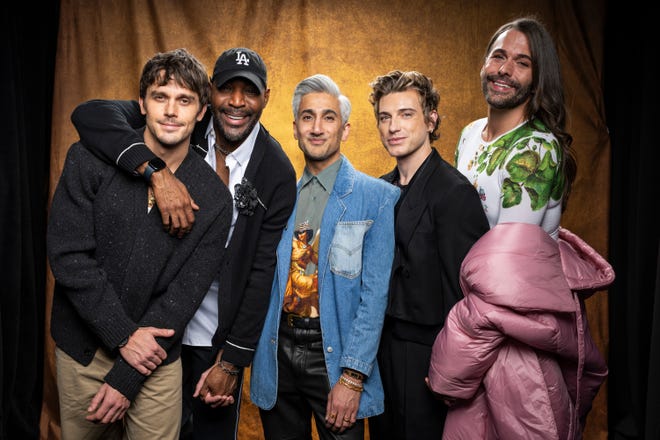The wide-ranging case against Sean “Diddy” Combs ensnared another member of rap royalty Sunday.
Jay-Z is accused in a freshly amended lawsuit of sexually assaulting a teenage girl alongside Combs at a 2000 MTV Video Music Awards after-party. The suit, filed originally in October on behalf of an unnamed Alabama woman, alleges Diddy and the Roc Nation founder drugged and raped her while another unnamed female celebrity watched.
Jay-Z vehemently denied the accusations, filing a motion to dismiss the lawsuit Monday and calling the legal action a “blackmail attempt” by lawyer Tony Buzbee, who filed the suit with the VMAs after-party allegations on behalf of the Jane Doe.

“My wife and I will have to sit our children down, one of whom is at the age where her friends will surely see the press and ask questions about the nature of these claims, and explain the cruelty and greed of people,” Jay-Z wrote in a statement shared to social media Sunday. The rapper and wife Beyoncé share three children: Blue Ivy, 12, and fraternal twins Rumi and Sir, 7.
USA TODAY has reached out to Buzbee for comment.
Need a break? Play the USA TODAY Daily Crossword Puzzle.
Jay-Z and Diddy’s career connections:Music moguls face sexual assault lawsuit
Why is Jay-Z being sued now for assault?
Several factors may be at play for the allegations now coming to the foreground.
Combs over the last year has been on the receiving end of an onslaught of civil lawsuits alleging rape and assault – including of some whom were minors – in addition to the criminal charges of sex trafficking, racketeering and transportation to engage in prostitution he’s facing, as he’s set to stand trial in May.
The blockbuster allegations against Diddy have had a domino effect: For some alleged victims, this past year may represent a watershed moment as they can now join a cadre of accusers rather than going it alone.
A relatively new New York law helped set off the series of events when Combs’ ex-girlfriend Cassie used it in 2023 to file a suit, alleging he trafficked her and subjected her to abuse when she was 19 years old. In 2022, the state passed the Adult Survivors Act, which allowed victims who were 18 or older at the time of alleged sexual abuse a one-time opportunity to bypass the statute of limitation and file civil lawsuits.

The window to use the law lasted a year and before it sunsetted, and a torrent of civil suits were filed, including several against Diddy.
New York expanded the statute of limitations for some sex crimes cases − both civil and criminal − to 20 years in 2019, but before that, it was typically one year for civil cases. If the victim alleges rape in the first degree there is no statute of limitations.
The “look back window” provided by the law acknowledges that many survivors are not ready to come forward with their experience until some time has passed.
Only 310 out of every 1,000 sexual assaults are reported to police, Rape, Abuse & Incest National Network reports. Of the sexual violence crimes not reported between 2005-2010, 20% chose not to do so for fear of retaliation, RAINN reports.
That same law was instrumental in E. Jean Carroll’s case − the magazine reporter who sued President-elect Donald Trump and won over accusations he defamed her following an alleged sexual assault in 1996.
Can anonymous accuser file criminal charges against Jay-Z, Diddy for alleged 2000 assault?
The original version of the suit was filed in October, after the window for the Adult Survivor’s Act closed the previous year. Though it did not originally name Jay-Z, it was amended Sunday to say the male celebrity accused was the “Empire State of Mind” rapper.
“These allegations are so heinous in nature that I implore you to file a criminal complaint, not a civil one,” Jay-Z wrote in a statement.
The anonymous accuser in this case may not be able to file a criminal complaint against Jay-Z, however, even with New York’s expanded window for sex crimes statutes of limitations; the alleged 2000 incident took place 24 years ago, more than the 20 that the new window allows.
A new law, the Child Victims Act, also allows victims under 18 at the time of assault to file a claim until they are 55, but only applies to assaults that took place after it was passed in 2019. The previous age was 23.

It is another law that allows the alleged victim to file a civil complaint, however: the Victims of Gender-Motivated Violence Protection Law. Like the Adult Survivor’s act it allows a look back window for survivors who were abused in New York City, where the civil lawsuit was filed.
This window for the Victims of Gender-Motivated Violence Protection Law remains open until March 1.
If you are a survivor of sexual assault, you can call the National Sexual Assault Hotline at 800.656.HOPE (4673) or visit hotline.rainn.org/online and receive confidential support.
Contributing: Edward Segarra





